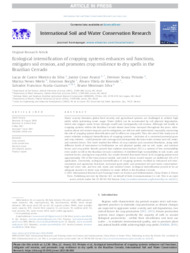Ecological intensification of cropping systems enhances soil functions, mitigates soil erosion, and promotes crop resilience to dry spells in the Brazilian Cerrado.
Ecological intensification of cropping systems enhances soil functions, mitigates soil erosion, and promotes crop resilience to dry spells in the Brazilian Cerrado.
Author(s): SILVA, L. de C. M. da; AVANZI, J. C.; PEIXOTO, D. S.; MERLO, M. N.; BORGHI, E.; RESENDE, A. V. de; ACUNA-GUZMAN, S. F.; SILVA, B. M.
Summary: Water scarcity threatens global food security and agricultural systems are challenged to achieve high yields while optimizing water usage. Water deficit can be accentuated by soil physical degradation, which also triggers water losses through runoff and consequently soil erosion. Although soil health in cropping systems within the Brazilian Cerrado biome have been surveyed throughout the years, information about soil erosion impacts and its mitigation are still not well understood; especially concerning the role of cropping system diversification and its effects on crop yield. Thus, the aim of this study was to assess whether ecological intensification of cropping systems einclusion of a consorted perennial grass and crop rotatione could promote soil coverage and consequently decrease water erosion and soil, water, and nutrient losses. This work studied the effects of crop rotation and consorted Brachiaria, along with different levels of investment in fertilization on soil physical quality and on soil, water, and nutrient losses, and crop yields. Results proved that soybean monoculture (SS) is a system of low sustainability even under no-till in the Brazilian Cerrado conditions. It exhibited high susceptibility to soil, water, and nutrient losses, causing low crop yields. Our results showed that water losses in SS cropping system were approximately 10% of the total annual rainfall, and total K losses would require an additional 35% of K application. Conversely, ecological intensification of cropping systems resulted in enhanced soil environmental and agronomic functions, increased grain yield, and promoted soil and water conservation: high soil cover rate, and low soil, water and nutrient losses. Ecological intensification proved to be an adequate practice to boost crop resilience to water deficit in the Brazilian Cerrado.
Publication year: 2021
Types of publication: Journal article
Unit: Embrapa Maize & Sorghum
Observation
Some of Embrapa's publications are published as ePub files. To read them, use or download one of the following free software options to your computer or mobile device. Android: Google Play Books; IOS: iBooks; Windows and Linux: Calibre.
Access other publications
Access the Agricultural Research Database (BDPA) to consult Embrapa's full library collection and records.
Visit Embrapa Bookstore to purchase books and other publications sold by Embrapa.

